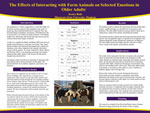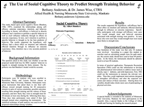James Wise, Professor
HCN 179
507-389-2128
james.wise@mnsu.edu
Credentials
- M.S. Experiential Education; Minnesota State University, Mankato, 2017
- Ph.D., Parks, Recreation, and Tourism; University of Utah, 1999
- M.P.E., Athletic Administration; Idaho State University, 1993
- B.A., Leisure Studies with Therapeutic Recreation emphasis; Iowa State University, 1986
- Certifications: Certified Therapeutic Recreation Specialist (CTRS)
Advisor
- Therapeutic Recreation Career Track
Primary Courses Taught
- Leisure and Lifestyle
- Therapeutic Recreation Services
- Therapeutic Recreation Process
- Therapeutic Recreation Assessment
- Therapeutic Recreation Techniques
- Advancement ofthe Therapeutic Recreation Profession
- Foundations for Therapeutic Recreation Practice
- Leisure, Recreation, Play, and Well-Being
- History and Philosophy of RPLS
Workshop Topics
- Generalization of Self Efficacy
- Philosophy and Therapeutic Recreation
- Flourishing and People with Disabilities
Selected Recent Publications
- Wise, J.B. (2024). Understanding disabled being in terms of corporeal variability, access, and meaning. Journal of Applied Hermeneutics, 1-17. https://doi.org/10.55016/ojs/jah.v2024Y2024.79925
- Wise, J.B. (2024). Finding meaning via contemplative leisure. Journal of Education and Recreation Patterns (JERP), 5(1), 100-107. https://doi.org/10.53016/jerp.v5i1.231
- Wise, J.B. (2024). Contemplative leisure and logotherapy. The International Forum for Logotherapy, 47(1), 33-46.
-
Wise, J.B. (2023). Being, play, leisure, and recreation. Leisure/Loisir, 1-20. https://doi.org/10.1080/14927713.2023.2295314
-
Wise, J.B. (2023). A form of leisure to treat busyness and enframing. World Leisure Journal, 65(3), 299-308. https://doi.org/10.1080/16078055.2023.2199711
-
Wise, J.B. (2021). Relationships among conceptualizations of flourishing in therapeutic recreation. Therapeutic Recreation Journal, 55(3), 322-341. https://doi.org/10.18666/TRJ-2021-V55-I3-10967
- Wise, J.B. (2021). Leisure and the therapeutic relationship: Contributing to meaningful lives. Therapeutic Recreation Journal, 55(2), 150-167. https://doi.org/10.18666/TRJ-2021-V55-I2-10739
- Wise, J.B., & Barney, K. (2021). A personal narrative conveying human flourishing. Therapeutic Recreation Journal, 55(1), 42-59. https://doi.org/10.18666/TRJ-2021-V55-I1-10430
- Wise, J.B. (2020). Friendships between therapeutic recreation specialists/recreational therapists and service recipients. American Journal of Recreation Therapy, 19(2), 8-14. https://doi.org/10.5055/ajrt.2020.0210
-
Wise, J.B. (2020). Flourishing through Leisure Practice Model, Capabilities Approach, and MacIntyre's Theory of Flourishing: Compatible and Interrelated. Therapeutic Recreation Journal, 54(1), 64-76.
- Wise, J.B. (2019). A conceptualization of recreation that contributes to human flourishing. Therapeutic Recreation Journal, 53(1), 37-52.
- Wise, J.B. (2018). Integrating leisure, human flourishing and the capabilities approach: Implications for therapeutic recreation. Therapeutic Recreation Journal, 52(3), 254-268.
- Wise, J.B. (2018). Preparing future professionals to serve as moral agents. American Journal of Recreation Therapy, 17(1), 15-19.
- Wise, J.B. (2017). Leisure and work: Interdependent facets of human flourishing. Therapeutic Recreation Journal,51(1), 1-17. Available from http://js.sagamorepub.com/trj/article/view/7963.
- Wise, J.B. (2016). Deepened ecological model: A fresh perspective on the experienc of disability. Therapeutic Recreation Journal, 50, 199-212. Available from http://js.sagamorepub.com/trj/article/view/7156/5748.
- Wise, J.B. (2015). Leisure: A Human Right. Therapeutic Recreation Journal, 49,166-178.
- Wise, J.B. (2014). What is Leisure? A MacIntyrian Based Response. Journal of Unconventional Parks, Tourism and Recreation Research,5(2), 17-22. What is Leisure? A MacIntyrian Based Response.
- Wise, J.B. (2014). Personhood, flourishing, disability, leisure and a profession. Journal of Unconventional Parks, Tourism and Recreation Research,5(1), 17-28. Personhood, flourishing, disability, leisure and a profession.
Examples of Student's Projects and Research
-
Recreation Inclusion
Research Conducted by Kaitlyn Graning
Academic Advisor - Dr. James Wise -
The Effects of Interacting with Farm Animals on Selected Emotions in Older Adults
Research Conducted by Jessica Bode
Faculty Mentor – Dr. James Wise, CTRS The purpose of this study was to determine if interacting with farm animals effects the emotions of older adults. The emotions selected for examination were anxiousness, loneliness, calmness and happiness. Statistical analyses revealed older adults became significantly less anxious and lonely. They also became more calm and happy but these changes were not statistically significant though the change in happiness approached significance. Future research should aim at determining why interacting with farm animals has a significant effect on alleviating negative emotions but not on enhancing positive emotions.
The purpose of this study was to determine if interacting with farm animals effects the emotions of older adults. The emotions selected for examination were anxiousness, loneliness, calmness and happiness. Statistical analyses revealed older adults became significantly less anxious and lonely. They also became more calm and happy but these changes were not statistically significant though the change in happiness approached significance. Future research should aim at determining why interacting with farm animals has a significant effect on alleviating negative emotions but not on enhancing positive emotions. -
The Use of Social Cognitive Theory to Predict Strength Training Behavior
Research Conducted by Bethany Anderson
Faculty Mentor – Dr. James Wise, CTRS This study, based upon social cognitive theory (Bandura, 1986, 1997), examined the relationships among self–efficacy, outcome expectancy, intention, and behavior. According to theory, self–efficacy is believed to directly influence one's intention to perform a specific behavior as well as exert influence indirectly through its effects on outcome expectancy. In turn, one's intention to perform a specific behavior is thought to be the best predictor of behavior. The results supported the hypothesis: self–efficacy had a direct effect on intention and indirectly effected intention through its influence on outcome expectancy. Also, intention was a very accurate predictor of behavior.
This study, based upon social cognitive theory (Bandura, 1986, 1997), examined the relationships among self–efficacy, outcome expectancy, intention, and behavior. According to theory, self–efficacy is believed to directly influence one's intention to perform a specific behavior as well as exert influence indirectly through its effects on outcome expectancy. In turn, one's intention to perform a specific behavior is thought to be the best predictor of behavior. The results supported the hypothesis: self–efficacy had a direct effect on intention and indirectly effected intention through its influence on outcome expectancy. Also, intention was a very accurate predictor of behavior. -
Psychometric Properties of the Global Leisure Satisfaction Scale
Research Conducted by Crystal Chalich
Faculty Mentor – Jim Wise, Ph.D.The purpose of this study was to examine the reliability and validity characteristics of the Global Leisure Satisfaction scale. The Global Leisure Satisfaction (GLS) scale and the Leisure Satisfaction Scale, a proven valid and reliable instrument, were administered to Mankato area citizens with disabilities. Reliability was examined through the calculation of Cronbach's alpha. The obtained value of .84 indicates that Global Leisure Satisfaction scale items tend to measure a single factor. Correlating scores of both leisure satisfaction scales provided evidence of validity. As anticipated, there was a strong positive correlation.
-
Relationship Between Leisure Satisfaction And Mental Health
Research conducted by Melissa Kalm
Faculty Mentor – Jim Wise, Ph.D.The purpose of this study was to examine the relationship between leisure satisfaction and mental health. Data was collected from surveys administered to 85 college students pursuing health related degrees. As anticipated, a strong positive correlation between leisure satisfaction and mental health was obtained.
-
Verbal Messages Strengthen Bench Press Efficacy
Research conducted by Amy Posner and Gretchen Walker
Faculty Mentor – Jim Wise, Ph.D.The purpose of this study was to examine the effects of message content on bench press efficacy. Thirty–two female university students who had not bench pressed within the previous 18 months were exposed to two sources of efficacy information. First, they performed 10 repetitions on a vertical bench press machine. Second, they heard one of two verbal messages. Both messages included the speaker's qualifications. In addition, one message conveyed specific performance feedback while the second one contained more general information. Efficacy was measured after each source. Results indicated both messages were equally effective in strengthening bench press efficacy. Strength professionals can create a more efficacious lifter by delivering verbal messages that communicate their qualifications, beliefs in the lifter's capabilities, and performance feedback. These messages should follow initial, successful accomplishments.
-
Using Social Cognitive Theory To Predict Behavior
Research conducted by Gretchen Walker and Amy Posner
Faculty Mentor – Jim Wise, Ph.D.The purpose of this study was to test a theoretical model where self–efficacy is hypothesized to influence peoples behavioral intentions directly and indirectly through effects on outcome expectancy. Data on self–efficacy, outcome expectancy, and intention to jog two consecutive miles were collected from 115 college students enrolled in general education classes. As anticipated, path analyses indicated that efficacy had both a direct impact on intention and an indirect impact through its effects on outcome expectancy. The more efficacious people were, the more positive the outcomes they associated with jogging and the surer they were they would jog. The model tested in this study holds potentially important implications for health professionals. Based upon the model, professionals can increase the likelihood people will perform healthy activities by developing interventions that lead to stronger self–efficacy and greater awareness of positive outcomes associated with the activities
-
The Systematic Fluctuations of Self–Efficacy, Happiness, and Anxiety During One Game of Bowling
Research Conducted by Vanessa Javes and Peter McAfee
Faculty Mentor – Jim Wise, Ph.D.The purpose of this study was to determine if self–reported values of self–efficacy, happiness, and anxiety systematically fluctuated during one game of bowling. The hypothesis was the values of the constructs would change when the environment was altered. Participants were 14 university students who were novice or recreation bowlers. Self–efficacy, happiness, and anxiety values were collected from each participant prior to him/her rolling a ball. Data for each construct for each participant were plotted on separate graphs and visually inspected. In general, and as hypothesized, the values of the variables fluctuated as the environment changed. This information should be incorporated into the multivariable explanatory models of human behavior TRSs develop to guide their professional practice.
-
The Impact of Performance and a Verbal Message on Bench Press Efficacy
Research Conducted by Emily Eby
Faculty Mentor – Dr. James B. Wise, CTRSThis study examined how bench pressing and listening to a message impacted bench press efficacy. Twenty-two participants who had not bench pressed during the previous 18 months were randomly assigned to an experimental or control condition. Those in the experimental condition self-selected an amount of weight and completed ten repetitions on a vertical bench press machine. Immediately afterward, one of the researchers read out loud a message that conveyed his qualifications, provided specific performance feedback and expressed his belief in the participants’ ability to bench press even more weight. Participants in the control condition sat quietly for a couple of minutes. Data analyses indicated participants in the experimental but not the control condition became significantly more efficacious toward bench pressing. Strength professionals should structure workouts to promote successful performances and verbally highlight lifters’ present achievements and communicate expectations for future achievements.


